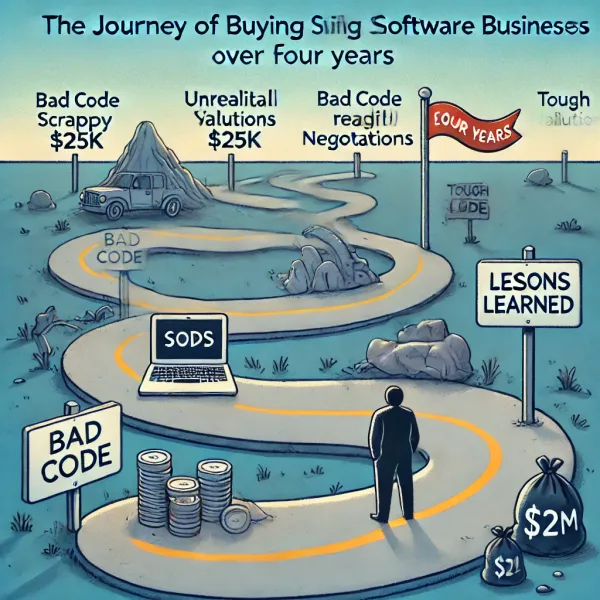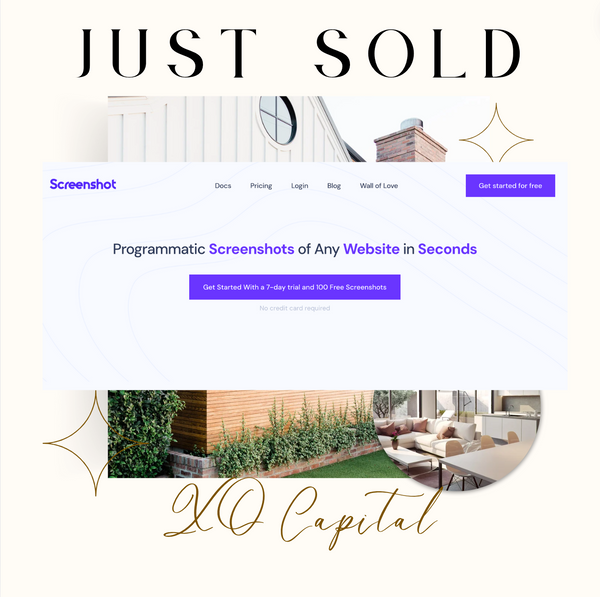XO 2.0

Products have versions, why don't companies?
Watch:
Listen:
A Lesson
Here's a quick riddle and a dopamine hit. A very strange lesson in psychology.
We purchased Growthbar. It required a credit card on signup. Also the entire country of India was blocked due to spam. One of the things we do when we buy a company is mess with pricing. We decided to:
- open the app up to India
- remove the mandatory credit card.
Sounds resonable right? Top of funnel would expectedly increase, signups would increase, conversions (should) increase...
EXCEPT DEMAND DROPPED TO LITERALLY ZERO. ZERO CONVERSIONS. I've never seen anything like it.
Almost without exception, when we buy a new company I break production trying to figure out how it works. This is usually 1 hour of downtime, and then I document stuff and it (usually) doesn't happen again. But this is the first time I've absolutely TANKED a new acquisition in the first 30 days of ownership lol.

Purple is new customers. Yellow is churn.
Steady State (before changes):

Removed credit card and opened app up to India:

Put forced credit card on signup back + kept India:

Yes this is recent, so we don't have more than a week's worth of data after putting the mandatory credit card back up.
So what's going on here? The most plausible explanation is that:
- By forcing a credit card, you are removing choice. People have "picked their tool" and stop searching and just use it.
- OR The timing of this was just crazy and we would have seen a pullback in August no matter what. (unlikely)
- Your guess is as good as mine.
The idea that the single largest check I've ever written is being held up by some psychological factor is scary as hell.
When I talk to people about XO, they're often quick to talk about synergies between companies. Learnings that could translate. Think the "Vista" playbook. All software taste's like chicken. Just copy paste, rinse, repeat, grow, sell, profit ... mucho margarita-on-the-beach. Except it ain't that easy. We've done this pricing experiment multiple times. It "usually" works.
So my new answer is that we aspire to have a playbook of robust experiments and also measure to the best of our ability the outcome across different companies over time. Our "playbook" will be a series of possible experiments to run that have probabilistic outcomes. Naive perhaps, but I did think we'd be able to do better than that.
XO
XO has been around in some shape for about 2.5 years now. The initial group at the beginning has had 100% turnover (except for me of course). Now we only have 4 full time people. 3 devs, 1 partner, and a few people that help us with content and contract engineering work.
Last month we let go of a long time customer support person and 1 developer who had been with us since the start. It's always difficult doing that. It's an awful conversation, but necessary to get profitable. We also shaved $1k off our cloud bill last month due to some clever engineering and optimizations. We're now running in the black even with a sizable debt payment for our most recent acquisition Growthbar.
This is our year of efficiency. All 3 partners are fully allocated. We've raised a $500k fund for another acquisition, and are currently looking at deals. We plan on running in the black for the rest of the year and if we can continue holding on to our current customer base, we may weather what has been a brutal summer for some products.
What is XO 2.0
- We're profitable
- We deliver excellence.
- We show up for each other.
I started b-school last week and have been kicking around the idea of defining a culture doc for XO but I only came up with 3 bullet points. I guess it's a start 🤷♀️ . Even 3 is a decent number though. You could actually use these to guide decisions. When a dev submits a PR they could ask "is it excellent". When we look to buy another company we can ask "is it profitable". If we're not sure about communication about something, that would fall under "showing up for each other". I was never a big culture nerd for companies sub 20 people but perhaps I'm wrong about that. Maybe it's even more important to do it now while we're still small. I don't think I'll be writing Ray Dalio's Principle's level stuff for us anytime soon but, hey, everything starts with aspiration.
Flip Fund Update
We closed the fund this week and took in over $500k. Our contribution will be 10% so we have at least $550k. If we find something slightly bigger we may ask existing investors if they want to put more in or fill in the rest ourselves. We're actively looking for deals in the $500k to $600k range.
Our buy box hasn't changed much. We're looking for:
- $15k to $40k MRR
- B2B SaaS
- 80%+ Gross Margins
- Limited platform risk
We're relaxing our typical requirement of a PLG company. After our experience with WorkClout it might make sense given this short time horizon (12-24 months) to have a sales led effort where we can more directly control our funnel. The sales led motion may give us our best shot of doubling a business in 24 months. That being said if we come across a "wonderful" product led growth company we will absolutely take a look.
Community
I'm dancing with the idea that XO could do what Cody Sanchez has done at Contrarian Thinking. In the mean time I've put a small community together on discord and genuinely have no idea how to facilitate value there other than to occasionally make myself available for questions. It looks like most of the people that follow us are looking to buy their first business. The community could be helpful in 101 ways and as such it's currently helpful in zero ways. I'd like to change that. If you have any suggestions, feel free to reply with your ideas!
I've also been considering creating a course. I have a lot of angst around being one of those people that create courses. I guess I had the same feeling towards people who cringe post on Linkedin. Now I'm out there climbing cringe mountain myself in public. It's humbling.





